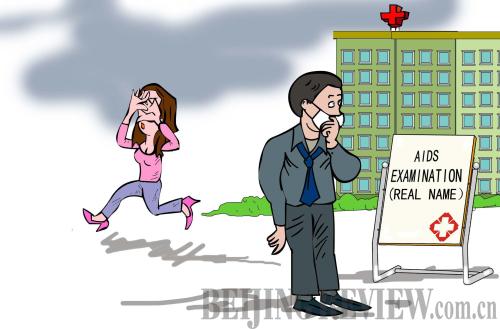|
 |
|
(LI SHIGONG) |
The Center for Disease Control and Prevention of Central China's Hunan Province announced on February 9 that real-name registration might be required for HIV/AIDS tests this year. Not long ago, real-name registration for HIV/AIDS tests was also mentioned in a draft regulation on AIDS prevention in southwest China's Guangxi Zhuang Autonomous Region. According to the draft, those who test positive for HIV are obliged to inform their spouses within 30 days after the confirmation of infection. If not, the local disease prevention and control agency has the right to inform their spouses.
The proposal on real-name registration for HIV/AIDS tests has triggered debates among the public. Responding to this, Wang Yu, Director of the Chinese Center for Disease Control and Prevention (China CDC), expressed his support for real-name registration, saying that this will greatly help AIDS treatment and prevention.
But a large number of HIV carriers, AIDS patients and some NGOs working on AIDS prevention oppose this proposal, arguing that real-name registration might discourage people from getting tested.
Lu Fan (China Central Television): On the whole, real-name registration will help the prevention and control of AIDS. There are several reasons for Hunan and Guangxi to adopt the real-name registration policy. First, the immediate beneficiaries are HIV carriers and those with AIDS. Without real-name registration, it's difficult for medical departments to find these people and thus provide them with necessary follow-up services. Second, real-name registration is good for overall AIDS prevention and control. Although this disease is currently kept in control to some extent in our country, we cannot ignore that in some areas and among certain groups of people, the AIDS infection rate is on the rise. Cases at home and abroad show that real-name registration makes it easier to inform carriers and related persons and help them take necessary measures to reduce high-risk actions, so as to mitigate the spread of AIDS. Third, real-name registration will provide useful information to medical agencies, so that they can work out effective policies on AIDS treatment and prevention.
Tang Xuepeng (21st Century Economic Report): Some people label real-name registration for HIV/AIDS tests a violation of privacy. Undeniably, AIDS patients are now disadvantaged people in our society, so we need to ensure their rights and interests. In the meantime, AIDS patients should ignore their own duties, which is to try their best to prevent the further spread of the disease to other people.
In China, more than 70 percent of AIDS patients are infected by sexual contacts, rather than by contaminated blood. They are mainly people between 20 and 40 years old. AIDS can be spread to innocent people, such as a patient's spouse or sexual partner. So we should not consider it as a "private thing."
Furthermore, AIDS is more complicated than other diseases. It might be more than a decade before a person with AIDS shows symptoms. During this period, they look normal, and may spread the virus to others at any time. This will pose a huge threat to the health and life of others.
Currently, discrimination is a major problem for AIDS prevention in China. Once an AIDS patient is exposed, he or she will be excluded by society. It is largely the huge pressure from society that makes people oppose the real-name registration proposal. But, this will lead to the reduction of testing. With no testing, how can we carry out the treatment and prevention work?
In addition, the "anonymous" state of HIV carriers or AIDS patients will not last long. As we know, AIDS is a chronic disease, and patients need to receive anti-virus treatment for many years. Also, if one is infected through drug injection, the government will provide methadone for treatment and if a baby is infected at birth, then other ways of feeding are necessary. Thus, once patients enter the treatment stage, they cannot stay "anonymous" forever. That is why even if many people test HIV positive anonymously, they still do not want to receive treatment.
So, I think that the justice of real-name registration is more important than protecting a patient's privacy or secrets. The infection information of HIV carriers and AIDS patients should be open to their spouses or sex partners. The medical departments need to partly open the information to prevent further spreading of the virus, and patients have the duty not to spread the virus.
Meanwhile, it's time to work out laws to combat discrimination against AIDS patients. If their personal information is exposed unjustly or revealed to unrelated persons, and they suffer discrimination as a result, AIDS patients should have the right to be compensated.
| 